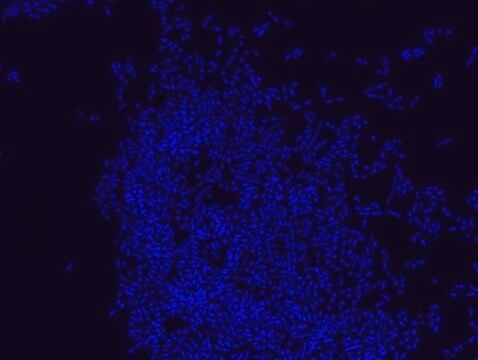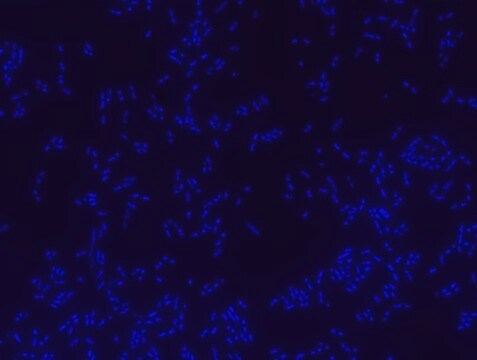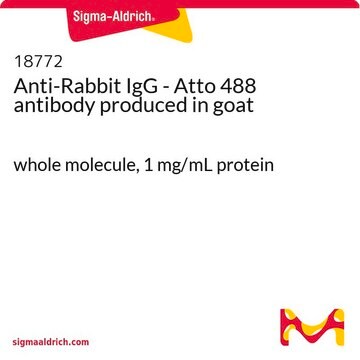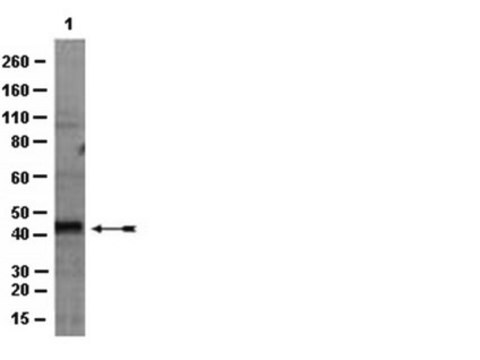MBD0051
Yeast FISH probe-Cy3
Probe for fluorescence in situ hybridization (FISH), 20µM in water
Sinonimo/i:
PF2-Cy3 probe
Scegli un formato
972,00 €
Scegli un formato
About This Item
972,00 €
Prodotti consigliati
Livello qualitativo
tecniche
FISH: suitable
Fluorescenza
λex 550 nm; λem 570 nm (Cy3)
Condizioni di spedizione
dry ice
Temperatura di conservazione
−20°C
Descrizione generale
FISH can serve as a powerful tool in the microbiome research field by allowing the observation of native microbial populations in diverse microbiome environments, such as samples from human origin (e.g., blood and other tissues), microbial ecology (biofilms, aquatic systems) and plants. It is strongly recommended to include positive and negative controls in FISH assays to ensure specific binding of the probe of interest and appropriate protocol conditions. We offer positive (MBD0032/33) and negative control probes (MBD0034/35) that accompany the specific probe of interest.
The yeast FISH (PF2-Cy3) probe specifically binds to a wide range of yeast species. [1] Examples include Candida species that are common causes of bloodstream infections in humans, common environmental yeasts, and model organisms (Saccharomyces) in the phylum Ascomycota. The probe offered here was tested on 5 strains belonging to: Candida albicans, Candida boidinii, Candida glabrata, Saccharomyces cerevisiae, and Schizosaccharomyces pombe. As a negative control, each slide contained fixed Proteus mirabilis bacterial cells in separate wells, to which the yeast FISH probe did not bind, confirming its specificity. For each experiment, an additional slide was stained with Eubacteria FISH probe - Cy3 (MBD0033). The Eubacteria FISH probe only stained the bacterial Proteus cells.
The yeast FISH (PF2) probe sequence was shown to specifically identify the yeast microbiome from various samples: murine intestine,[2] blood samples[1] and in environmental samples.[3]
Applicazioni
Caratteristiche e vantaggi
- Visualize, identify, and isolate yeast cells. Observe native yeast populations in a variety of samples.
- Specific, sensitive, and robust identification of yeasts in bacterial mixed population.
- FISH can complement PCR based detection methods by avoiding contaminant bacteria detection.
- Provides information on yeast morphology.
- Identifies yeasts in clinical samples.
- The ability to detect yeasts in their natural habitat is an essential tool for studying host-microbiome interaction.
Codice della classe di stoccaggio
12 - Non Combustible Liquids
Classe di pericolosità dell'acqua (WGK)
WGK 1
Punto d’infiammabilità (°F)
Not applicable
Punto d’infiammabilità (°C)
Not applicable
Scegli una delle versioni più recenti:
Certificati d'analisi (COA)
Non trovi la versione di tuo interesse?
Se hai bisogno di una versione specifica, puoi cercare il certificato tramite il numero di lotto.
Possiedi già questo prodotto?
I documenti relativi ai prodotti acquistati recentemente sono disponibili nell’Archivio dei documenti.
Filtri attivi
Il team dei nostri ricercatori vanta grande esperienza in tutte le aree della ricerca quali Life Science, scienza dei materiali, sintesi chimica, cromatografia, discipline analitiche, ecc..
Contatta l'Assistenza Tecnica.

